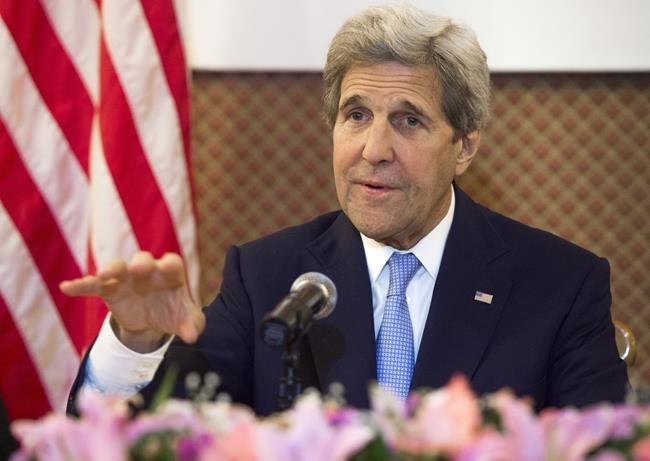
U.S. Secretary of State John Kerry speaks during a joint press conference with Mongolian Foreign Minister Lundeg Purevsuren following their meeting at Foreign Ministry in Ulaanbaatar, Mongolia, Sunday, June 5, 2016. (Saul Loeb/Pool Photo via AP)
Republished June 04, 2016 - 11:16 PM
Original Publication Date June 04, 2016 - 6:15 PM
ULAANBAATAR, Mongolia - Cultivating closer ties in this land of Genghis Khan lore and traditional yurts, U.S. Secretary of State John Kerry on Sunday tried his hand at archery, sampled curdled cheese and watched ancient wrestling, all while hailing Mongolia as a modern "oasis of democracy" in its neighbourhood.
For Mongolia, sandwiched between undemocratic China and increasingly authoritarian Russia, the desire for deeper relations was mutual.
Kerry's stop in this nation of 3 million people included heaps of praise for its unlikely democratic story. Parliamentary elections next month will be the seventh since 1990, when this vast territory of grassy steppe and nomadic herders shook off its status as a Soviet satellite state.
But the top American diplomat also pushed for greater transparency in Mongolia, a sensitive issue given the foreign scramble for its rich resource deposits and questions about how revenue is being shared among the country's many impoverished citizens.
In March, hundreds of protesters gathered for a rare demonstration in the capital's central square, demanding parliament be dissolved and a new government formed. Nevertheless, mining giant Rio Tinto announced last month the next stage of a multibillion-dollar gold and copper mine that had become a symbol of the tension.
The government is expected to finalize a transparency agreement with the U.S. in coming weeks, Kerry said. Doing so, he said, will help attract foreign investment and boost an economy expected to shrink slightly this year amid sinking commodity prices and weakened demand from China.
"Mongolia has made remarkable progress for a young democracy," Kerry told reporters. He credited it for contributing troops to Afghanistan and Iraq, helping even younger democracies in Kyrgyzstan and Myanmar in their transitions, and being a "responsible global citizen."
Kerry was to travel later Sunday to Beijing for annual U.S.-China strategic and economic talks. And his comments about China in a question-and-answer session, just moments after praising Mongolia, stood in stark contrast.
With reports suggesting China may establish an air defence zone in the contested South China Sea, Kerry warned against what he said would be a "provocative and destabilizing act." Such action would raise tension between China and its Asian neighbours, he said, and undermine China's commitment to diplomatically resolve disputes over islands and maritime claims. The matter is likely to be a major focus of discussions in the next days.
Sunday also included fun and games. After lunching with Mongolia's Harvard-educated president, Elbegdorj Tsakhia, Kerry attended a "naadam," a competition with archery, horseback riding and wrestling.
The scene in the verdant fields outside Ulaanbaatar, accompanied by an orchestra playing triumphal music, illustrated Mongolia's rich cultural heritage. The games come from the nomadic tribes which spread from this territory across Asia, the Middle East and Europe, at one point amassing the largest land empire in human history.
First came the wrestling: Men in slips, chest-less tunics and leather boots hurling each other to the ground, while spectators sipped sour-flavoured, fermented mare's milk.
Then, Kerry fired two arrows at a target 75 metres away. He missed, but acquitted himself decently. Moments later, horseback riders sprinted to the nearby finish line of their race. The festivals usually last several hours; Sunday's version was condensed to 45 minutes.
Before Kerry, Hillary Clinton visited Mongolia as secretary of state in 2012. Vice-President Joe Biden travelled here in 2011 and Defence Secretary Chuck Hagel stopped by three years later, all to support what the U.S. calls Asia's "plucky democracy."
Wanting to safeguard its sovereignty, Mongolia has been reaching out to Washington as part of its "third neighbour" policy.
The approach is somewhat similar to several southeast Asian nations developing friendlier relations with Washington because they feel threatened by China's rising military and economic might.
Kerry, who announced a $2.5-million democracy program targeting Mongolia's young leaders, said the two countries shouldn't be defined by their geographical separation.
"When it comes to our hopes, our aspirations for our people," Kerry said, "we really couldn't be closer."
News from © The Associated Press, 2016